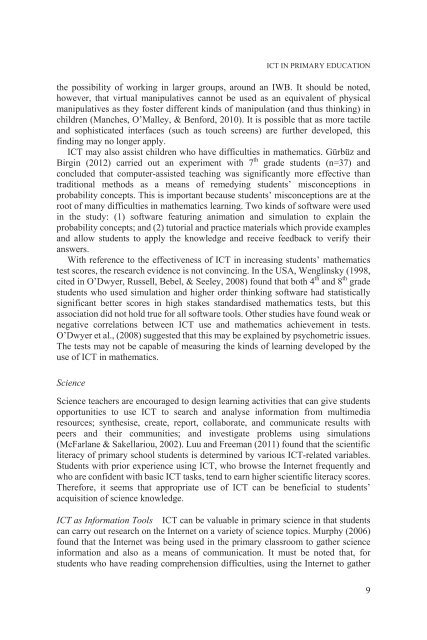1517-creating-holistic-technology-enhanced-learning-experiences
1517-creating-holistic-technology-enhanced-learning-experiences
1517-creating-holistic-technology-enhanced-learning-experiences
Create successful ePaper yourself
Turn your PDF publications into a flip-book with our unique Google optimized e-Paper software.
ICT IN PRIMARY EDUCATION<br />
the possibility of working in larger groups, around an IWB. It should be noted,<br />
however, that virtual manipulatives cannot be used as an equivalent of physical<br />
manipulatives as they foster different kinds of manipulation (and thus thinking) in<br />
children (Manches, O’Malley, & Benford, 2010). It is possible that as more tactile<br />
and sophisticated interfaces (such as touch screens) are further developed, this<br />
finding may no longer apply.<br />
ICT may also assist children who have difficulties in mathematics. Gürbüz and<br />
Birgin (2012) carried out an experiment with 7 th grade students (n=37) and<br />
concluded that computer-assisted teaching was significantly more effective than<br />
traditional methods as a means of remedying students’ misconceptions in<br />
probability concepts. This is important because students’ misconceptions are at the<br />
root of many difficulties in mathematics <strong>learning</strong>. Two kinds of software were used<br />
in the study: (1) software featuring animation and simulation to explain the<br />
probability concepts; and (2) tutorial and practice materials which provide examples<br />
and allow students to apply the knowledge and receive feedback to verify their<br />
answers.<br />
With reference to the effectiveness of ICT in increasing students’ mathematics<br />
test scores, the research evidence is not convincing. In the USA, Wenglinsky (1998,<br />
cited in O’Dwyer, Russell, Bebel, & Seeley, 2008) found that both 4 th and 8 th grade<br />
students who used simulation and higher order thinking software had statistically<br />
significant better scores in high stakes standardised mathematics tests, but this<br />
association did not hold true for all software tools. Other studies have found weak or<br />
negative correlations between ICT use and mathematics achievement in tests.<br />
O’Dwyer et al., (2008) suggested that this may be explained by psychometric issues.<br />
The tests may not be capable of measuring the kinds of <strong>learning</strong> developed by the<br />
use of ICT in mathematics.<br />
Science<br />
Science teachers are encouraged to design <strong>learning</strong> activities that can give students<br />
opportunities to use ICT to search and analyse information from multimedia<br />
resources; synthesise, create, report, collaborate, and communicate results with<br />
peers and their communities; and investigate problems using simulations<br />
(McFarlane & Sakellariou, 2002). Luu and Freeman (2011) found that the scientific<br />
literacy of primary school students is determined by various ICT-related variables.<br />
Students with prior experience using ICT, who browse the Internet frequently and<br />
who are confident with basic ICT tasks, tend to earn higher scientific literacy scores.<br />
Therefore, it seems that appropriate use of ICT can be beneficial to students’<br />
acquisition of science knowledge.<br />
ICT as Information Tools ICT can be valuable in primary science in that students<br />
can carry out research on the Internet on a variety of science topics. Murphy (2006)<br />
found that the Internet was being used in the primary classroom to gather science<br />
information and also as a means of communication. It must be noted that, for<br />
students who have reading comprehension difficulties, using the Internet to gather<br />
9


